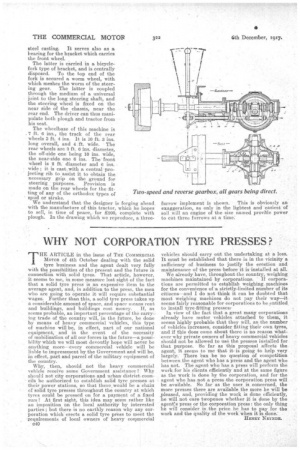WHY NOT CORPORATION TYRE PRESSES?
Page 20

If you've noticed an error in this article please click here to report it so we can fix it.
THE ARTICLE in the issue of THE COMMERCIAL MOTOR of 4th October dealing with the solid Lyre business and the agent dealt very fully with the possibilities of the present and the future in connection with solid tyres. That article, however, it seems to me, in some measure lost sight of the fact that a solid tyre press is an expensive item to the average agent, and, in addition to the press, the men who are going to operate it will require substantial wages. Further than this, a solid tyre press takes up a considerable amount of space, and space means rent
and buildings, and buildings cost money. If, as seems probable an important percentage of the carryin trade of the g country will, in the future, be done by means of heavy commercial vehicles, this type of machine will be, in effect, part of our national equipment, and in the event of the necessity of mobilization of all our forces in the future—a possibility which we will most devoutly hope will never be anything more—every commercial vehicle will be liable to impressment by the Government and will be, in effect, .part and Parcel of the military equipment of the country. . Why, . then ll , should not the heavy commercial vehicle receive some Government assistance ? Why should not city corporations and urbandistrict. coonoils be authorized to establish solid tyre presses at their power stations, so that there_would be a chain of 'solid tyre presses throughout the country at which tyres could be pressed on for a payment of a. fixed sum ? At first sight, this idea may seem rather like an imposition on the local authority by interested parties ; but there is no earthly reason why any corporation which erects a solid tyre press to meet the 'requirements of local owners of heavy commercial
vehicles should carry out the undertaking at a loss. It must be established that there is in the vicinity a sufficiency of business to justify the erection and maintenance of the press before it is installed at all.
We already have, throughout the country, weighing machines maintained by corporations. ' If corporations are permitted to establish weighing machines for the convenience of a strictly-limited number of its citizens—and I do not think it can be doubted that most weighing machines do not pay their way—it seems fairly reasonable for corporations to be entitled to install tyre-fitting presses:
In view of the fact that a great many corporatioes already have motor vehicles attached to them, it seems highly probable that they will, as the number of vehicles increases, consider fitting their own tyres, and if this does come about there is no maseri whatever whY private owners of heavy commercial vehicles should not be allowed to use the presses installed for that purpose. So far as this proposal affects the agent, it seems to me that it is going to help very largely. There 'can be no question of competition between the agent who has a press and the agent who has not. The agent who has a press will perform the woik. for his clients efficiently and at the same figure as the work is done by the corporation, and for the agent who has not a press the corporation press will be available. $o _far as the user, is concerned, the more presses there are available the more he will be ,pleased, and, providing the work is done efficiently, he will not care twopence whether it is done by the agents press or the corporation press: the only thing he will consider is the price he has to pay for the work and the quality of the work when it is done.
HENRY NEYNDE,
































